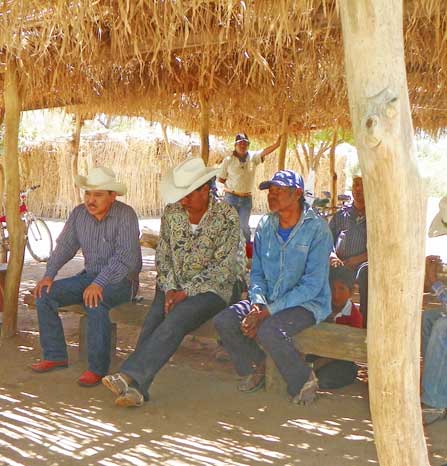The Independencia Aqueduct unleashes unforeseeable consequences

Mario Luna (left), official spokesperson for the Yaqui tribe and water rights activist, speaks with Meloncoyote at the Yaqui tribal headquarters in Vicam. The Sonora state government imprisioned him and Fernando Gutiérrez for a year in a maximum security prison, in violation of their rights, according the National Human Rights Commision ruling. (Photo: Melóncoyote Archives).
MEXICO CITY
On December 16th 2015, the National Commission on Human Rights (CNDH) announced that they had issued a recommendation to Sonora governor Claudia Pavlovich Arellano in which it rules that compensation be awarded to Yaqui tribal leaders Mario Luna and Fernando Gutierrez for the violation of their right to self-determination and due process.
The press release points out that the two were imprisoned for a year, and that the agent from the Public Prosecutor subjected them to criminal proceedings without first having verified their standing as tribal leaders.
The CNDH determined that the compensation amount would be established in coordination with the Executive Commission for Victim Assistance. The two leaders would also be enrolled in the National Victim Registry so that they could access the Fund for Comprehensive Relief, Assistance and Reparations established under the General Law for Victims.
At the same time, the commission is asking the Federal Attorney General to provide classes for state public servants to teach about the customs and practices of indigenous people in general, and emphasizing the relevance of the right of indigenous people to unimpeded self-determination and application of their own system of standards to resolve internal conflicts.
It should be remembered that Luna, leader and spokesperson for the Yaqui tribe, was detained arbitrarily without a legal warrant on September 11th 2014, and Gutierrez a few days later, by undercover agents of the Federal Ministerial Police, and then imprisoned for more than a year in a maximum security prison in Hermosillo.
They were accused of stealing a car, but civil society organizations believe the detentions took place in a context of Yaqui opposition to the plundering of water from the Rio Yaqui, the lifeblood of their community and vital to their survival. The water’s diversion was made possible by the Independencia Aqueduct, built by the former Guillermo Padrés government, which is now accused, among other crimes, of money laundering and diversion of public funds.
Padrés' goal was to redirect the water to the thirsty state capital of Hermosillo which is located in a desert and has historically been supplied by the Río Sonora. The latter was contaminated in 2014 by a heavy metal spill from the Buenaventura del Cobre copper mine in Cananea. This environmental crime is still unresolved and Grupo de Mexico, responsible for the spill, has gone unpunished.
Contamination, discrimination, criminalization, and the unchecked rise in the cost of water are other unforseeable consequences of the governmental theft of Yaqui water, say analysts.
Anthropologist and scholar of Yaqui history and culture, Raquel Padilla concedes that “they convinced us (Hermosillo residents) that the Independencia Aqueduct is crucial. Huge billboards, radio announcements, TV commercials, street performances and, above all, the unofficial voice of the media such as El Imparcial, all support water terrorism, and consequently to the spread of ethnic terrorism.
According to what Agua de Hermosillo, the state water utility, says on it’s website, ‘a large percentage of Hermosillo residents, even those who call themselves, or are known as, activists do not support the Yaqui fight to defend their river’, absurdly arguing that the Yaqui are, or were PRI party members. Others are afraid that their taps at home will stop flowing. They haven’t realized that the Aqueduct will end at the industrial park and they haven’t noticed that Heineken, Ford, the cement and bottling plants are practically the only ones to benefit, given that just 7% of residents, people like you and me, are getting this water in our homes,” Padilla concludes.
At the same time the municipal government and the state congress approved an increase in water rates, including a 60% raise for domestic use, arguing that the government water department is bankrupt and because their new water treatment plant has come online. The new treatment plant is supposed to produce water that is clean enough to be used for a wide range of needs such as agriculture, livestock, industry, construction, tourism and recreation. Depending on supply, demand and the existing distribution infrastructure, it could also be used for watering roadways, gardens, sports fields and the like.
The public reaction was immediate, the increase being met with great opposition, and even more after news got out that the company would be restructured in preparation for its privatization by investors from Mexico City and Spain.
